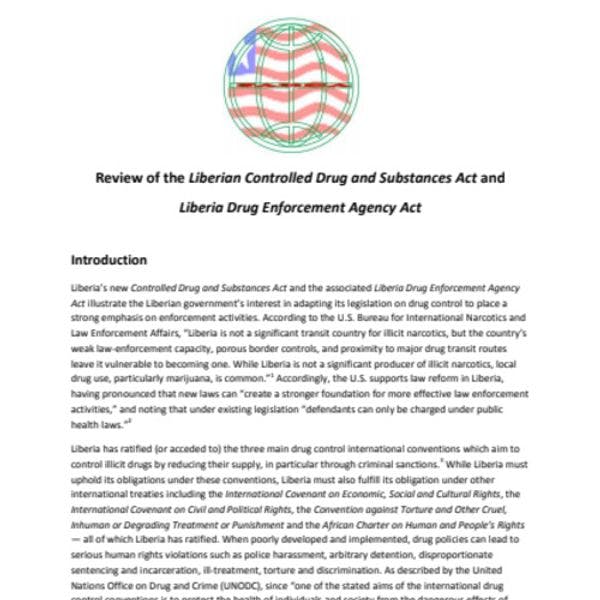Review of the Liberian Controlled Drug and Substances Act and Liberia Drug Enforcement Agency Act
Liberia’s new Controlled Drug and Substances Act and the associated Liberia Drug Enforcement Agency Act illustrate the Liberian government’s interest in adapting its legislation on drug control to place a strong emphasis on enforcement activities. According to the U.S. Bureau for International Narcotics and Law Enforcement Affairs, “Liberia is not a significant transit country for illicit narcotics, but the country’s weak law-enforcement capacity, porous border controls, and proximity to major drug transit routes leave it vulnerable to becoming one. While Liberia is not a significant producer of illicit narcotics, local drug use, particularly marijuana, is common.” Accordingly, the U.S. supports law reform in Liberia, having pronounced that new laws can “create a stronger foundation for more effective law enforcement activities,” and noting that under existing legislation “defendants can only be charged under public health laws.”
Liberia has ratified (or acceded to) the three main drug control international conventions which aim to control illicit drugs by reducing their supply, in particular through criminal sanctions. While Liberia must uphold its obligations under these conventions, Liberia must also fulfill its obligation under other international treaties including the International Covenant on Economic, Social and Cultural Rights, the International Covenant on Civil and Political Rights, the Convention against Torture and Other Cruel, Inhuman or Degrading Treatment or Punishment and the African Charter on Human and People’s Rights — all of which Liberia has ratified. When poorly developed and implemented, drug policies can lead to serious human rights violations such as police harassment, arbitrary detention, disproportionate sentencing and incarceration, ill-treatment, torture and discrimination. As described by the United Nations Office on Drug and Crime (UNODC), since “one of the stated aims of the international drug control conventions is to protect the health of individuals and society from the dangerous effects of drug use,” human rights laws are also relevant because they guarantee the right to life and the right of “everyone to enjoy the highest attainable standard of physical and mental health.” Problematic drug laws can not only exacerbate the harms associated with drug dependence, but also lead to a wide range of other preventable health conditions, such as HIV and hepatitis C virus (HCV). Under human rights law, states have a binding legal obligation to take steps to realize the right to health, including steps “necessary for… prevention, treatment and control of epidemic, endemic… and other diseases” and “the creation of conditions which would assure to all medical services and medical attention in the event of sickness.”
Keep up-to-date with drug policy developments by subscribing to the IDPC Monthly Alert.
